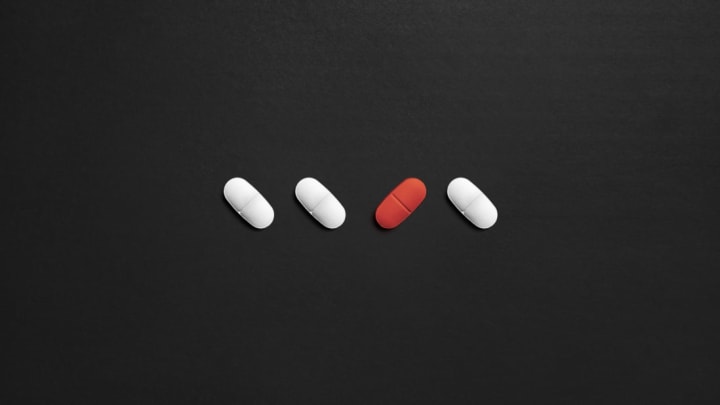There’s a reason eating your grandmother’s chicken soup or dabbing your temples with essential oil of peppermint might make you feel better if you’re sick, and it’s probably not because they're truly curative. Your relief is likely the result of the placebo effect.
A placebo is an inert substance, such as a sugar pill or saline solution, that is specifically given to a patient because it's not intended to have a measurable effect on their physiology. Placebos are often used as controls in clinical trials and experiments to set a baseline by which to compare the effects of new drugs and medical treatments. They’re not supposed to be treatments in and of themselves. And yet studies show that placebos not only often have a measurable effect on the people who take them, but can actually improve someone's condition.
Researchers have documented this effect for pain treatment, irritable bowel syndrome, and high-altitude sickness, among other conditions. Even sham knee surgeries have been shown to produce nearly identical pain relief to actual meniscus surgery.
What's going on here?
GREAT EXPECTATIONS
John Kelley, deputy director of the Program in Placebo Studies (PiPS) at Beth Israel Deaconess Medical Center at Harvard Medical School, tells Mental Floss that a patient's expectations about whether or not a medication will work are central to the placebo effect. Even the color and size of placebo pills have been shown to affect the power of fake medicine. Both small and large pills elicit a stronger placebo effect than middle-sized ones. People assume that a tiny pill "must be really powerful medicine if it’s so small,” Kelley explains, while an oversized pill makes people think, ‘Wow, there’s a lot of medicine there. I’m getting a big treatment.’”
Another factor at work is whether an individual has had previous experience with the form of treatment, called conditioning, and has thus developed what Kelley calls “a conscious expectancy” that it will work again. The greater the conditioning, often the greater the placebo effect.
The human element is key, too. A patient's sense of the competence and warmth of their practitioner, and their comfort in the treatment setting—"a fancy, prestigious medical school versus a ramshackle, dubious-looking office,” Kelley says—can influence the placebo effect.
THE BIOLOGY OF BELIEF
Having an expectation of healing leads to the physiological relief of symptoms because there's a biological process underpinning our responses. “Every thought, emotion, and feeling we have has a biological substrate,” Kelley says. For example, the brains of people given placebos for pain medication have been shown to release naturally occurring opioids, which provide actual pain relief. Research has shown that anticipation stimulates the brain’s reward system, just as opioid drugs do.
What’s more, Kelley says, in trials where patients were conditioned to receive pain relief from either the opioid morphine or a placebo, and then subsequently were given the opioid-blocking drug Nalaxone, the drug prevented both the morphine and the placebo from giving the patients pain relief. Researchers suspect that merely having an expectation of relief recruited the brain to release the endogenous opioids—which were then blocked by the Nalaxone.
Similarly, placebo trials of Parkinson’s medications have also found that patients' brains release dopamine in response to placebos, temporarily relieving symptoms such as tremors and stiff muscles. Kelley says the brain likely uses different mechanisms to respond to different conditions, which could explain why, for example, it produces endogenous opioids for pain and dopamine for Parkinson’s.
Placebos can work even when recipients know they're taking a placebo. That was the case in one seminal study involving patients with irritable bowel syndrome [PDF], in which researchers found that giving patients pills clearly labeled as placebos reduced the severity of their symptoms versus control participants who received no pills at all.
More research is necessary to understand why placebos can work even when we know they shouldn't, but the lead researcher of the IBS study, Ted Kaptchuk, also with the PiPS program, told NPR that “a trusting relationship between the doctor and patient” is likely important. Perhaps the expectation of being cared for is enough to bring relief to some.
Kelley believes it may come down to a kind of selective attention. Even if a patient knows they're taking a placebo, they're “paying attention to one set of stimuli and avoiding another,” he says, which redirects their focus from pain to an experience of relief.
While scientists continue to unravel the mysterious power of the mind to influence the body, the next time you have a headache, maybe try a sugar pill instead of an aspirin; it can’t hurt, and it might even help.
Have you got a Big Question you'd like us to answer? If so, let us know by emailing us at bigquestions@mentalfloss.com.
